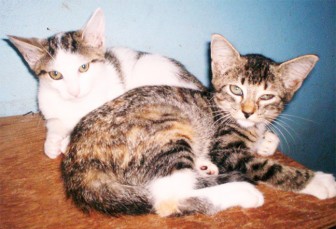Unfortunately, we pet owners are often not very careful in the way we leave poisonous substances lying around. Sometimes, the thought does not cross our minds that something as common as petrol or waste oil, when stored incorrectly, can be the source of poisoning. Petroleum products fall into this category.
Symptoms
Gasolene and kerosene are volatile liquids which can cause respiratory distress, if inhaled. If ingested, the animal can die within 24 hours.
The signs of toxicity from contact with these fluids are:
• Vomiting
• Difficulty in breathing
• Twitching of the muscles (tremors)
• Convulsions leading to a coma and subsequent death
Treatment

Usually, when poisons are ingested, one should quickly try to create a retching reflex so as to expel the poison from the stomach. In the case of some liquid petroleum products, the absorption is quick, and that itself precipitates vomiting. One should therefore not try to induce vomiting. Instead, one should administer a tablespoon (or two, according to the size of the dog) of olive oil or any vegetable oil, orally. You should follow this up (30 minutes later) with Glauber’s Salts. If the dog is showing respiratory failure you may have to introduce artificial respiration (chest compression and/or mouth to nose techniques) which we have described elsewhere previously.
Poisoning with corrosives
Many household cleaners, drain decloggers and commercial solvents contain caustic and corrosive chemicals. The curious pet, touching these substances with his mouth, experiences burns. If ingested, these caustic and corrosive chemicals can create severe lesions inside the oral cavity and on the mucous membrane linings of the oesophagus and stomach.
If the corrosive substance is an acid, then you must rinse out the animal’s mouth as soon as possible. Then you can administer an antacid (Phillips Milk of Magnesia or Pepto Bismol or some similar chemical preparation) to counteract the acid. Do not induce vomiting.
If the caustic substance is an alkali, then you can give the dog lemon juice or diluted vinegar. You can dilute the vinegar with water at a one to four ratio. Don’t overdose the acid vinegar/lemon juice solution: two to five teaspoonsfuls, according to the size of the dog. Again, do not induce vomiting, since the caustic substance can create more burns in the oesophagus and mouth on its way back up.
Please implement disease preventative measures (vaccinations, routine dewormings, monthly anti-heartworm medication, etc) and adopt-a-pet from the GSPCA’s Animal Clinic and Shelter at Robb Street and Orange Walk, if you have the wherewithal to care well for the animals. Do not stray your unwanted pets, take them to the GSPCA’s Clinic and Shelter instead. If you do not wish your pet to have puppies or kittens, you may exploit the GSPCA’s free spay and neutering programme. If you see anyone being cruel to an animal, or if you need any technical information, please get in touch with the Clinic and Shelter by calling 226-4237.





